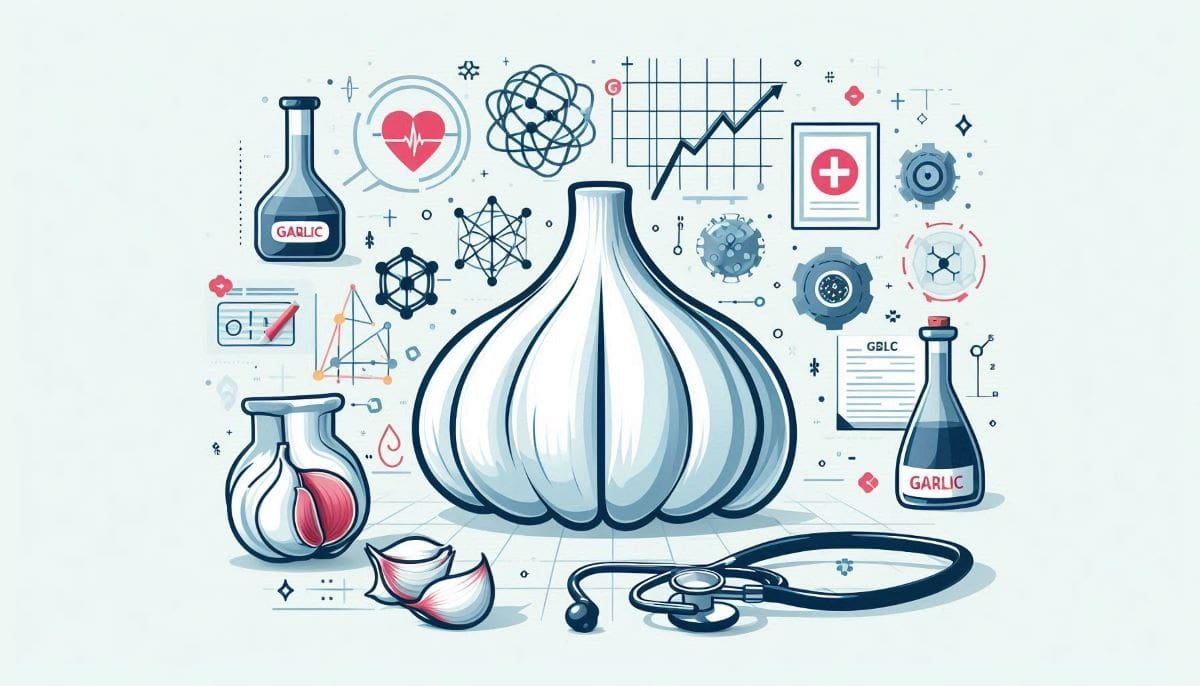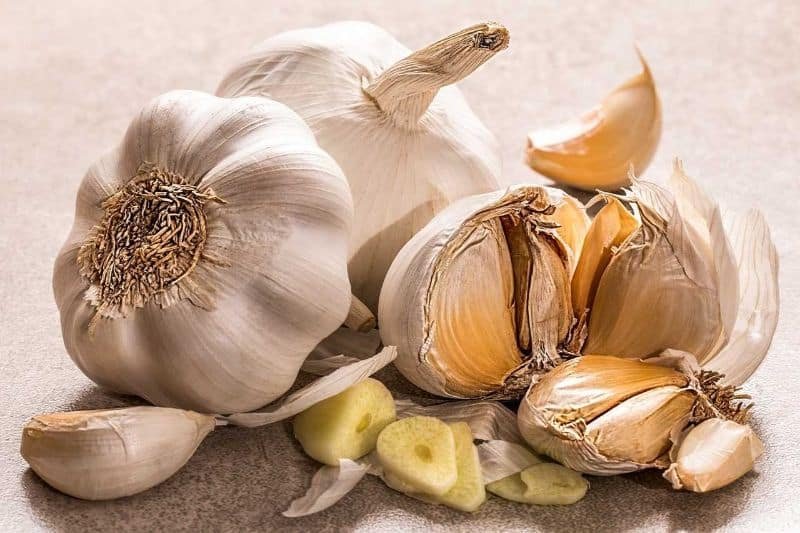14 Proven Garlic Health Benefits Backed By Research
Benefits, Nutrition Profile and Potential Side Effects

Garlic Health Benefits | Nutrition Profile| About Garlic | Side Effects | FAQ
Did you know that garlic can help keep your heart healthy and boost your immune system? Garlic isn’t just good for adding flavor to your food; it’s also packed with health benefits that scientists have studied for years.
In this post, you will learn how garlic can lower blood pressure, regulate cholesterol, and protect your body against diseases. We will also explore how garlic can help with diabetes and even reduce the risk of cancer.
But first, here are 5 fun-facts about garlic you probably never heard before..
FUN FACTS ABOUT GARLIC
- Garlic can be used as a natural adhesive. The sticky juice from crushed garlic cloves has been used historically as a glass and porcelain adhesive.
- Ancient Greek athletes ate garlic before competing in the earliest Olympic games, believing it enhanced their performance.
- Garlic has been used as currency in some cultures. In ancient Egypt, garlic cloves were sometimes used to pay laborers working on the pyramids.
- There’s a phobia specifically for fear of garlic called alliumphobia. It’s named after the Allium genus which garlic belongs to.
- Garlic can potentially help repel mosquitoes. Some studies suggest that consuming garlic may make you less attractive to these biting insects.
Garlic Health Benefits
Garlic offers a myriad of health benefits, substantiated by extensive research highlighting its efficacy in various domains. For those of you in a hurry, here’s a table summarizing what you’re about to read.
| Benefit | Description |
|---|---|
| Reduces Blood Pressure | Helps relax blood vessels by increasing nitric oxide and hydrogen sulfide production, blocking ACE, and providing antioxidants. |
| Regulates Cholesterol | Lowers LDL (bad) cholesterol, may raise HDL (good) cholesterol, and reduces inflammation for better heart health. |
| Stimulates Immune Function | Boosts immune cell activity, controls inflammation, provides antimicrobial properties, and supports gut health as a prebiotic. |
| Reduces Respiratory Infections | Contains antimicrobial compounds like allicin that fight bacteria and viruses, potentially reducing infection frequency and severity. |
| Anti-Inflammatory | Lowers inflammation markers, blocks inflammatory pathways, and enhances immune cell function to combat excessive inflammation. |
| Antioxidant Properties | Contains compounds like allicin that neutralize free radicals, protecting cells from oxidative damage and stress. |
| Anticancer Properties | May prevent and slow cancer growth by inhibiting cell proliferation and angiogenesis, and inducing cancer cell death. |
| Increases Testosterone Levels | Boosts testosterone production in men by enhancing luteinizing hormone and protecting testes from damage. |
| Improves Male Fertility | Enhances sperm quality, movement, and shape while reducing oxidative stress and improving testicular structure. |
| Regulates Blood Sugar | Lowers fasting blood sugar and HbA1c levels, improves insulin production and sensitivity, beneficial for diabetes management. |
| Weight Management | May help reduce waist size and body fat by increasing energy expenditure and activating AMPK. |
| Prevents Cognitive Decline | Protects brain cells from beta-amyloid damage, potentially slowing Alzheimer’s progression and improving memory and learning. |
| Improves Bone Health | May reduce pain and inflammation in osteoarthritis and benefit postmenopausal women with osteoporosis. |
| Detoxifies Body | Helps remove heavy metals like lead from the body, reducing symptoms associated with metal toxicity. |
1. Reduces Blood Pressure
Eating garlic regularly has been shown to help lower blood pressure. This happens through several ways. Garlic helps the body make more hydrogen sulfide (H2S) and nitric oxide (NO), which both help to relax blood vessels. This makes it easier for blood to flow, which lowers blood pressure. [1]
Garlic also blocks a chemical called angiotensin-converting enzyme (ACE) that can make blood vessels tighten up. By blocking ACE, garlic helps keep blood vessels relaxed. [2] [3]
Several studies have looked at the effects of garlic on blood pressure. For example, a review of many studies found that people with high blood pressure who took garlic supplements had lower blood pressure readings. This included both systolic blood pressure (the top number) and diastolic blood pressure (the bottom number). [4]
2. Regulates Cholesterol
Many studies have shown that adding garlic to your diet can help control cholesterol levels, which is good for your heart.
Garlic can lower bad cholesterol (LDL) and might raise good cholesterol (HDL). This happens because garlic affects how the body makes cholesterol, especially by slowing down an enzyme called HMG-CoA reductase. [5] [6]
In one study with mice that had high cholesterol, garlic extract reduced LDL (bad cholesterol) by 48% and increased HDL (good cholesterol) by 47%. [7]
Another review showed that garlic is effective at lowering cholesterol and triglycerides in different groups of people. [5]
3. Stimulates Immune Function
A lot of scientific studies show that the special substances in garlic can really help improve the immune system.
One of these substances is called allicin, and it, along with other sulfur-based compounds, helps the body fight off sickness by boosting the activity of important immune cells like macrophages, lymphocytes, and natural killer cells. These cells are like the body’s soldiers, protecting us from harmful germs. [8]
Garlic also helps control cytokines, which are proteins that manage how the body handles inflammation. This balance is important because too much or too little inflammation can make it harder for the body to stay healthy. [9]
Plus, garlic has antimicrobial properties, meaning it can directly fight off harmful bacteria and viruses. This reduces the workload on the immune system. [10]
Garlic is also a prebiotic, which means it helps the growth of good bacteria in the gut. [11]
A healthy gut is very important for a strong immune system because much of the body’s immune function is connected to the digestive system. [12]
P3-OM – PREBIOTICS AND PROBIOTICS SUPPLEMENT
Crowd out unhealthy bacteria in the gut, Reduces gas and bloating, Supports healthy immune system.
⭐⭐⭐⭐⭐ | 4.8 (37 reviews)

4. Reduces Respiratory Infections
As mentioned earlier on, Garlic is well-known for boosting the immune system, but it also shows promise in reducing respiratory infections. This is because garlic has strong antimicrobial and antiviral properties. Allicin, can fight off bacteria and viruses that cause respiratory infections. [13]
Research shows that eating garlic can lower the chances of getting respiratory infections and can make the infections shorter and less severe. This is especially helpful for people who are more at risk, like older adults. [14] [15]
Adding garlic to your diet can be a good way to help protect yourself from respiratory illnesses.
Check this amazing garlic ginger soup for inspiration.
5. It is highly Anti-Inflammatory
Garlic is known for its strong ability to fight inflammation. Inflammation is when your body reacts to injury or infection, and sometimes it can cause problems if it happens too much.
Garlic can help reduce inflammation by lowering specific markers in the body, such as C-reactive protein (CRP) and tumor necrosis factor-alpha (TNF-alpha). [16]
Other compounds in garlic, like Z-ajoene and allicin, also help by stopping the body from making other chemicals that cause inflammation. These include IL-1 beta, IL-6, and iNOS. They do this by blocking certain pathways in the body, like NF-kappa B and STAT3, which are involved in inflammation. [17] [18]
6. Has antioxidant properties
Garlic is not just known for its strong flavor; it also has powerful antioxidant properties, which help protect the body from damage caused by free radicals. These properties come from special compounds in garlic, like allicin and allyl cysteine. [19] [20]
Garlic can be used in many forms, including fresh garlic, aged garlic extract (AGE), and even black garlic. For instance, aged garlic extract can boost the body’s natural antioxidant enzymes and stop the damage to fats in the body. Black garlic, which is garlic that has been fermented, has a lot of phenolic compounds that also act as antioxidants. [21] [22] [23]
Studies show that all types of garlic preparations can help the body fight oxidative stress. [24]
This means they can increase the body’s total antioxidant capacity (TAC) and lower levels of malondialdehyde (MDA), a marker of cell damage. This helps protect important parts of our cells, like lipids, proteins, and DNA, from being harmed. [25]
7. Has Anticancer Properties
Research has shown that certain natural compounds in garlic called (organosulfur compounds) can help prevent and slow down cancer.
These special compounds, are allicin, diallyl sulfide, and diallyl disulfide, can stop cancer cells from growing, make them die, and stop new blood vessels from forming around them. This is important because cancer cells need blood to get nutrients and grow. [25] [26]
Due to Garlic’s strong antioxidant properties, it can fight harmful substances called reactive oxygen species (ROS). These substances can damage cells and lead to cancer. By fighting ROS, garlic helps protect cells from damage. [27]
Studies have also found that people who eat more garlic are less likely to get colorectal cancer, which is cancer of the colon or rectum. This suggests that garlic might help prevent this type of cancer. [28]
8. Increases Testosterone Levels in Men
Garlic is well-known for its ability to help prevent cancer, but it also has important benefits for men’s health. Studies show that garlic can help increase testosterone levels. Garlic’s special substances (allicin and diallyl disulfide) help the body produce more testosterone in the testes and also lower cortisol, the stress hormone.
One study found that giving garlic to mice increased their testosterone levels. This happened because garlic helped boost the luteinizing hormone (LH), which is needed for making testosterone. [29]
Another study on rats found similar results. They showed that garlic not only increased testosterone but also protected the testes from getting damaged. [30]
Garlic also has an effect on a gene called CYP19, which helps keep a balance between testosterone and estrogen, another important hormone. This means garlic can help maintain a healthy level of testosterone compared to estrogen. [30]
RELATED: Testonine Review: Here’s What I Think About This All Natural Testosterone Booster
9. Improves Male fertility (Spermatogenesis)
Garlic shows a lot of promise in helping improve male fertility by boosting the production of sperm.
A review of 18 different studies found that garlic can improve the quality, movement, and shape of sperm. Garlic has strong antioxidant properties, which help reduce oxidative stress. Oxidative stress can harm the process of making sperm. [31]
Besides, garlic helps improve the structure of the testicles and can increase testosterone levels. Both of these factors are important for making healthy sperm. This means that garlic might be a good natural option for men who have trouble with fertility.
Nova IVS fertility clinic, mentions that garlic is rich in allicin and selenium. Allicin helps improve blood flow to sexual organs and protects sperm from damage, while selenium, enhances sperm motility. It even mentions that if you’re trying to conceive, you should consider eating one or two cloves of garlic a day.
10. Regulates Blood Sugar
One of the many health benefits of garlic is helping to control blood sugar levels.
Multiple studies show that taking garlic can lower fasting blood sugar (FBS) and HbA1c levels, which are important measures for diabetes. This effect is similar to how some diabetes medicines, like metformin, work. [32] [33] [34]
The ability of garlic to lower blood sugar is because it helps the body produce more insulin and makes insulin work better.
These findings suggest that garlic could be used alongside other treatments to help manage diabetes. However, it’s important to talk to a doctor before adding garlic supplements to your routine, as it might interact with other medications or conditions.
11. Weight Management
Scientists have been studying how garlic might help people manage their weight.
They have found that garlic can help reduce waist size and body fat, especially in people with metabolic syndrome and nonalcoholic fatty liver disease. [35]
For example, a 2019 review published in the journal Vitamin and Nutrition Research found that garlic might help reduce waist circumference but didn’t significantly affect body weight or BMI. Researchers analyzed data from 13 randomized clinical trials involving garlic supplements. They discovered that garlic could reduce waist size by an average of 1.10 cm.
In animal studies, garlic helped mice lose weight and reduce fat. This happened because garlic made their bodies burn more energy and activate a protein called AMP-activated protein kinase (AMPK). [36] [37]
While these studies are promising, this doesn’t mean that by eating garlic alone you’ll lose weight. What you eat and how much you exercise are the number 2 things that affect weight loss.
12. Prevents Alzheimer’s disease and Cognitive Decline

Aged garlic extract (AGE) might help prevent Alzheimer’s disease and cognitive decline. This is because it has strong antioxidant and anti-inflammatory properties. Research shows that AGE can protect brain cells from damage caused by beta-amyloid proteins, which are linked to Alzheimer’s disease. [38]
In animal studies, AGE has been shown to improve learning and memory problems. It does this by affecting neurotransmitter systems like acetylcholine, glutamate, and GABA, which are important for brain function. [39]
An important part of AGE is a compound called S-allylcysteine (SAC). SAC helps by boosting the body’s antioxidant defenses and reducing inflammation in the brain. [39]
13. Improves Bone Health
Garlic might help keep bones healthy, especially for women who have gone through menopause and have conditions like osteoporosis or osteoarthritis. Osteoporosis makes bones weak, and osteoarthritis causes joint pain and stiffness.
In one study, scientists gave garlic tablets to 42 postmenopausal women with osteoporosis. They found that the garlic tablets helped lower bad protein levels in the blood and increased good antioxidants. Antioxidants help protect the body from damage. [40]
Another study looked at 80 postmenopausal women who were overweight or obese and had knee osteoarthritis. The women who took garlic supplements felt less pain and had lower levels of a harmful protein called resistin. However, another protein, TNF-α, did not change much. [41]
14. Detoxifies Body From Heavy metals
Research has shown that garlic can help remove heavy metals, like lead, from the body.
In a study with 117 workers from a car battery factory, garlic supplements were given to them three times a day. Each dose contained 1200 micrograms of allicin, which is an active compound in garlic. After taking these supplements, their blood lead levels dropped from 426.32 to 347.34 micrograms per liter. [42]
Garlic worked as well as a common medicine called d-penicillamine, which is often used to treat lead poisoning. Besides lowering lead levels, garlic also helped reduce symptoms such as irritability, headaches, and high blood pressure which are associated with high lead levels in the body. Importantly, garlic had fewer side effects compared to the medicine. [42]
These results suggest that garlic could be a safer and effective alternative for treating mild-to-moderate lead poisoning. This shows that garlic might be a useful natural way to detoxify the body from harmful metals.
Garlic Nutrition Profile

Garlic is a small but powerful food that packs a lot of important nutrients. It is low in calories, with just 4.47 calories in one clove (which is a single clove of garlic).
Here’s a table Data for 1 clove, taken from USDA’s FoodData Central.
| Name | Amount | Unit |
|---|---|---|
| Energy | 4.47 | kcal |
| Protein | 0.191 | g |
| Total lipid (fat) | 0.015 | g |
| Ash | 0.045 | g |
| Carbohydrate, by difference | 0.993 | g |
| Calcium, Ca | 5.43 | mg |
| Iron, Fe | 0.051 | mg |
| Magnesium, Mg | 0.75 | mg |
| Phosphorus, P | 4.59 | mg |
| Potassium, K | 12 | mg |
| Sodium, Na | 0.51 | mg |
| Zinc, Zn | 0.035 | mg |
| Copper, Cu | 0.009 | mg |
| Manganese, Mn | 0.05 | mg |
| Selenium, Se | 0.426 | µg |
| Vitamin C, total ascorbic acid | 0.936 | mg |
| Thiamin | 0.006 | mg |
| Riboflavin | 0.003 | mg |
| Niacin | 0.021 | mg |
| Pantothenic acid | 0.018 | mg |
| Vitamin B-6 | 0.037 | mg |
| Folate, total | 0.09 | µg |
| Choline, total | 0.696 | mg |
| Vitamin B-12 | 0 | µg |
| Vitamin B-12, added | 0 | µg |
| Vitamin A, RAE | 0 | µg |
| Retinol | 0 | µg |
| Carotene, alpha | 0 | µg |
| Cryptoxanthin, beta | 0 | µg |
| Vitamin A, IU | 0.27 | IU |
| Lycopene | 0 | µg |
| Lutein + zeaxanthin | 0.48 | µg |
| Vitamin E (alpha-tocopherol) | 0.002 | mg |
| Vitamin E, added | 0 | mg |
| Vitamin D (D2 + D3), IU | 0 | IU |
| Vitamin D (D2 + D3) | 0 | µg |
| Vitamin K (phylloquinone) | 0.051 | µg |
| Fatty acids, total saturated | 0.003 | g |
| Fatty acids, total trans | 0 | g |
| Cholesterol | 0 | mg |
About Garlic

Garlic, known scientifically as Allium sativum, is a plant that belongs to the onion family. It has been grown for thousands of years and is famous both for its use in cooking and for its health benefits. Garlic originally comes from Central Asia but is now used all over the world.
The part of the garlic plant that we use is called the bulb, which is made up of smaller sections called cloves. When you crush or chop garlic, it releases a compound called allicin. Allicin gives garlic its strong smell and is also responsible for many of its health benefits.
People have used garlic in food and medicine for a very long time. For example, the ancient Egyptians, Greeks, and Chinese all used garlic to treat different health problems. Today, scientists have found that garlic can help keep your heart healthy, support your immune system, and might even lower the risk of some types of cancer.
In cooking, garlic is very popular in many different cuisines, from Italian pasta dishes to Asian stir-fries. Its strong flavor makes it a key ingredient in many recipes around the world.
Potential Side Effects
Garlic is well-known for its many health benefits, but it can also cause some side effects that need to be taken seriously. Here are a few things to watch out for:
- Stomach Problems: Eating raw garlic or a lot of garlic can lead to issues like heartburn, gas, feeling sick, and diarrhea. For example, someone who eats raw garlic cloves might feel a burning sensation in their stomach.
- Allergic Reactions: Although it’s rare, some people can be allergic to garlic. This can cause skin rashes or even more serious reactions like anaphylaxis, which is a severe, life-threatening allergic reaction.
- Blood Thinning: Garlic has properties that can thin the blood, which might lead to an increased risk of bleeding. This is especially important for people who are taking blood-thinning medicines like warfarin.
- Medicine Interactions: Garlic can also affect how some medicines work. For instance, it might change how well certain drugs work in your body.
These possible side effects show why it’s important to not eat too much garlic and to talk to a doctor if you have health problems or are taking specific medicines.
Frequently Asked Questions
Read Also
